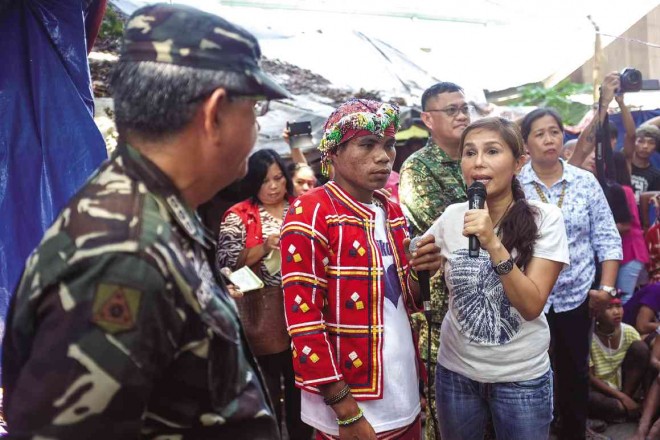Manobo evacuees file raps vs raiders

DISPLACED “lumad” said they were insulted by the way the dialogue led by North Cotabato 2nd District Rep. Nancy Catamco was conducted at an evacuation center in Davao City last July 22.KARLOS MANLUPIG/INQUIRER MINDANAO
(Last of two parts)
DAVAO CITY—Manobo people have been living peacefully in the mountains of Davao del Norte and Bukidnon provinces, surviving on hunting, gathering and simple communal farming.
More than 700 of them, however, left their homes out of fear of government soldiers and militiamen who came to their villages, and sought shelter at an evacuation center here. On July 23, all hell broke loose when police and government agents tried to barge inside the facility and forcibly bring back the indigenous people, allegedly on orders of North Cotabato Rep. Nancy Catamco.
Davao City Mayor Rodrigo Duterte, who was then in Manila, said situation turned violent because it was mishandled by Catamco. He said he had a standing order for police to avoid violence—until Catamco intervened.
“The problem there is really deep. It is really ideology that’s working out there. The Alamara is the armed component of the government that was let loose in the mountains and they strike fear in the hearts of the lumad (indigenous people),” Duterte said, referring to the militia unit with Manobo members.
Article continues after this advertisementCatamco had earlier criticized the mayor for issuing an “irresponsible statement” that the issue could be settled only through talks with the Communist Party of the Philippines.
Article continues after this advertisement‘Niceties of life’
“That’s not being irresponsible. I’m teaching her the niceties of life,” Duterte countered. In a harsher tone, he said Catamco should stick to being a lawmaker, not a troublemaker.
“She should have gone to a body, either the Department of Justice or the Commission on Human Rights to do something. She’s a legislator. She’s not supposed to take the law into her own hands just because she’s the representative of the lumad,” Duterte said.
“She is irresponsible. She is the one who does not want to listen to reason,” he added.
Duterte said the military should step back to allow the lumad to return to their homes. “And the Alamara, it has to be controlled. Otherwise, they are allowing a situation where a Filipino will kill a Filipino,” he said.
Complaint
On Friday, the United Church of Christ in the Philippines (UCCP), Manobo datus and displaced residents filed charges against those involved in the raid, including usurpation of authority, physical injuries in a tumultuous affray, serious physical injuries, qualified trespass to dwelling, grave threats, grave coercion and malicious mischief.
The respondents included Catamco, Davao City police deputy director Supt. Marvin Pepino, San Pedro police station chief Senior Insp. Ronald Lao and Col. Jake Obligado of the military’s Eastern Mindanao Command. All were present during the scuffle.
Cases were also filed against Kapalong Mayor Edgardo Timbol and Vice Mayor Ma. Teresa Timbol; Rebeca Santamaria, assistant regional director of the Department of Social Welfare and Development (DSWD); Pedrita Dimaquiling, head of the DSWD regional crisis intervention unit; leaders of the Alamara, several policemen; and John Does.
The complainants were represented by Dean Manuel Quibod of Ateneo de Davao Law School, and lawyers Faye Risonar-Bello and Kay Paquera.
Chaloka Beyani, the United Nations Special Rapporteur on the human rights of internally displaced persons, expressed concern over cases of “militarization” and the presence of paramilitary groups in Mindanao that have displaced hundreds of indigenous people in Davao del Norte and Bukidnon.
During his 10-day visit to the Philippines, Beyani went to the Manobo evacuation center at the UCCP Haran Evacuation Center. He said the military claim that it was only protecting lumad interests contradicted the narratives of the evacuees.
“I heard from the AFP its assertion that it is seeking to protect the communities and provide services to them in conflict regions; however the displaced IPs (indigenous people) made it clear that it is their presence and that of the paramilitary groups in their communities that continues to create anxiety amongst the indigenous communities,” Beyani said.
“The community wishes to return to its lands but stressed to me that they will only feel safe to do so if the long-term militarization of their region comes to an end and they can return with guarantees of safety, dignity and protection,” he added.
UN concern
The UN Special Rapporteur said among the pressing concerns was the forced recruitment of indigenous people to join a the Alamara, which is believed to behind cases of human rights violations.
“They (evacuees) described to me their concerns including their alleged forced recruitment into paramilitary groups, known as Alamara, under the auspices of the AFP and harassment in the context of the on-going conflict between the AFP and the NPA (New People’s Army),” Beyani said.
He expressed alarm over reports of occupation by military and Alamara forces of schools, disrupting classes of children.
Beyani affirmed that the lumad were not being held by anyone against their will inside the center. However, he said the situation needed an immediate and peaceful solution, particularly by addressing the issues on militarization and development programs.
“It is essential to find a rapid and peaceful solution to their situation in full consultation with their legitimate leaders, with their voluntary and secure return to their ancestral lands being a high priority. I urge the government, in consultation with indigenous peoples themselves, to give greater attention to addressing the causes of displacement whether it be due to the militarization of their areas or due to development projects,” he said.